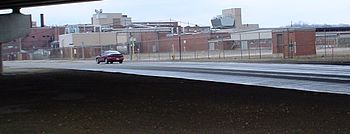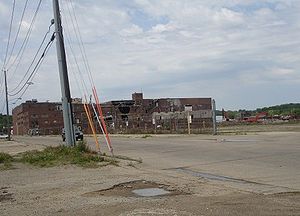- Dubuque Packing Company
-
The Dubuque Packing Company was a former meat packing company based in Dubuque, Iowa. It was recognized for the quality of its products, and in the 1950s it became one of the largest employers in the city. The company was widely known in the community as "The Pack." The company had the fleur-de-lis as its logo and trademark.
History
In June 1891 the Dubuque Packing Company was founded by the merger of the Dubuque Packing & Provision Company and the Dubuque Butchers Association. For the next forty years, the company acted as a local meat supplier. In 1931 Harry Wahlert purchased the plant for $80,000. At the time of Wahlert's purchase, the company employed only sixty people. Even though America was in the middle of the Great Depression, the company flourished under Wahlert's leadership.
Following World War II, the company became the first company to export food to Italy when it exported canned hams to Italy. In the 1950s the company was the largest employer in the Dubuque in front of the John Deere Dubuque Works manufacturing plant because the Dubuque Packing House is located within the city the Deere works is not. During the 1960s, under the leadership of Robert C. Wahlert, the plant employed about 3,500 people, with a payroll of about $20 million. In 1948, ten employees of the Dubuque Packing Company pooled $5 each, in combination with a loan for $123.20 from the Amalgamated Meat Cutters Local Number 150, to charter Dupaco Credit Union, which eventually became Dupaco Community Credit Union.
Labor union negotiations with the company made workers at the plant amongst one of the highest paid employers in the city. Dun's Review listed the company as the 15th largest privately held company in the United States in 1978, with sales of about $390 million dollars. At its peak, the company's sales approached $2 billion and it had 12 plants. It was the 3rd largest beef slaughter in the U.S.
The company was also recognized for the quality of the products they made. In 1960 and 1961 the company won gold medals at the California state fairs for their canned hams. They also became one of the largest suppliers of kosher meat in the United States.
By the 1980s, the Dubuque plant began to decline. In 1980 the Dubuque Packing Company announced that they lost $9.9 million dollars at its Dubuque facility. They asked the union for concessions, based on claims of market changes, high wages, and equipment problems. The company also shut down parts of the plant. By 1981 nearly 1,400 were unemployed when the hog kill was shut down. Then in 1982 company management announced that the plant would close on October 16, 1982, which would put 1,200 people out of work and bring the unemployment rate up to 17.2 percent. This was despite a 15.8 percent cut in pay and benefits that union workers had taken, and a reduction in taxes by the city.
In the fall of 1982, the President and Chairman of Dubuque Packing Company Charles E. Stoltz sold the packing plant and its fleur-de-lis trademark to a group which included Robert H. Wahlert. The packing plant began operations as FDL Foods, Inc. The Dubuque Packing Company moved its headquarters to the Dubuque Building, where it continued to bargain with the union over pension and insurance benefits. In 1985 the headquarters was moved to Omaha, Nebraska to be more centrally located to its other plants, which were processing primarily beef at that time. The company again flourished and was later sold in a leverage buyout. Its gelatin operations were sold to a French company.
Current status
The packing plant in Dubuque operated under the FDL Foods Inc. name until September 1995 when the plant again closed, this time due to the loss of the sole contract with Hormel (as reported to workers by management in July 1995). The plant was eventually sold to Farmland Foods, who continued to operate the plant until 2001. Smithfield Foods purchased the plant with the stated intention of refurbishing and reopening the plant. However once Smithfield purchased the plant they decided not to proceed with either remodeling or reopening the plant. This led to the belief that Smithfield only purchased the plant to remove competition from the market.
For the next four years, the former Dubuque Packing Company plant sat empty. From time to time Dubuque police used the plant for training purposes, but otherwise no activity took place there. Many in the community felt that the abandoned plant was an eyesore - especially given its position near the Mississippi River and U.S. Highway 61 & U.S. Highway 151. In 2003, Wal-Mart expressed interest in the site for a second supercenter. But when the city decided against supplying tax incentives, Wal-Mart decided not to proceed with the project.
Then in 2004 local developer Wayne Briggs announced his plans to tear down the plant and redevelop the site as a shopping center. This new shopping center would have national retailers, and would give the northeastern parts of the city more shopping options. Briggs purchased the plant site. The Dubuque County zoning board gave their approval to the plans. On March 21, 2005 the entire city council approved the rezoning of the site.
Demolition of the old packing plant was slow going due to concerns over hazardous waste such as asbestos. The asbestos was gone by May 2006, when a fire began at the former packing plant. The Dubuque Fire Department handled the fire, taking it slowly because of the instability of the partially demolished building. Briggs said at the time that the fire wouldn't affect the demolition schedule, and by October 1, 2006, the buildings were totally demolished. Currently site preparation is being done to prepare the site for construction.
Categories:- Defunct agriculture companies of the United States
- Economy of Dubuque, Iowa
- Defunct companies based in Iowa
- Companies based in Iowa
- Meatpacking
Wikimedia Foundation. 2010.


